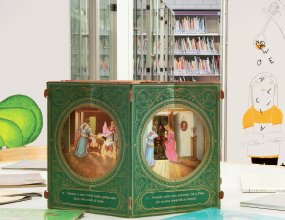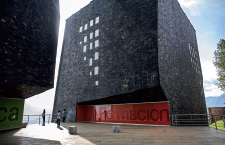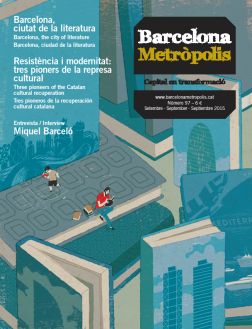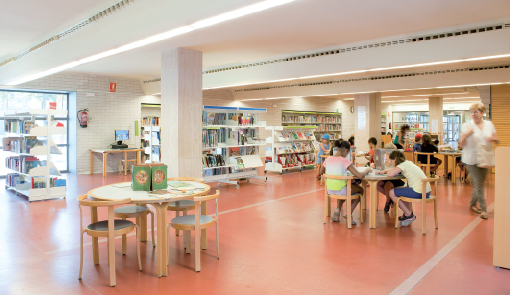The municipal network of libraries is one of Barcelona’s strongest selling points in its candidacy as a UNESCO City of Literature, and it has formed a central part of the project since its outset.
An indoor square, a comfortable space that invites you to read but also to do other activities, surrounded by the warm presence of shelves stacked with books of all kinds. This is the library model established by Barcelona’s municipal library plan, which has been created with one objective in mind: to make reading attractive. In just under twenty years, the network has grown from eighteen libraries to the current number of forty. The impact on Barcelona’s residents is clear to see: the number of library card holders has escalated from 13% to 54%. The network of libraries is thus one of the Catalan capital’s strongest selling points in its candidacy as a UNESCO City of Literature, and it has formed a central part of the project since the outset.
“We represent the city’s residents, and our aim is to promote reading through different means and areas, but above all we want to encourage reading in children and young people”, said Assumpta Bailac, manager of Barcelona’s library network, Biblioteques de Barcelona. To this end, the organisation is pursuing two primary goals: firstly, the creation of an extensive cultural programme for the children’s areas within the libraries (1,100 activities in 2014), as well as direct interaction with primary and secondary schools (1,785 visits in 2014). And secondly, promotion of the extraordinary collection of the Children’s and Young Adult Literature Documentation Service, located in the Xavier Benguerel library in Vila Olímpica.
Lola Anglada’s novella on the anti-fascist child published during the Spanish Civil War, a three-metre long concertinaed Little Red Riding Hood from 1965, the entire Patufet collection and all the volumes by Folch i Torres can be found in this collection of 30,000 documents, 16,000 of which are historical. “We have books from the 19th century, children’s and young adult classics from all different periods and in different languages; an invaluable collection for publishers, illustrators and researchers, who come from all over to study it”, explains Neus Castellano. The director of the Benguerel library recalls how, when they received a visit from Alberto Manguel, the writer was thrilled to discover in one of the display cases the story that his German nanny used to read to him in Buenos Aires.

Albert Armengol
Edition of La Ventafocs (Cinderella) from 1960 published by Roma, part of the archive of the Children’s and Young Adult Literature Documentation Service, located in the Xavier Benguerel library in the Vila Olímpica.
The collection, created in 1940, originally came from the Sant Pau i Santa Creu Library and has since been added to with very select donations. The Service was created in 1975 and for reasons of space was moved in 2005 to Benguerel, a library which was opened in 1995 and specialises in film. So far, 200 historical works have been digitized and will be available on Trencadís, the library network’s digital collection run by the Diputació de Barcelona. “Whenever we hold an exhibition, we tie it in with the historical collection so that we can showcase this heritage which is not available to the general public. For example, today we find lots of pop-up books, and you might think they are a new idea, but at the turn of the century there were already some real marvels being made”, comments Castellano as she shows a theatre pop-up book of Alice in Wonderland from 1940, on display recently in the Món Llibre children’s literature fair, and a Mickey Mouse pop-up from 1931.
The library is one of the most active when it comes to organising activities around its collection, including workshops for students on the Master in Children’s and Young Adult Literature, as well as its new releases sessions in which publishing houses present their latest publications to librarians. The children’s area, presided over by Tintin, also offers some of the very finest illustrated books with exceptional volumes including the nostalgic work by Benjamin Lacombe and the minimalist books of Katsumi Komogata – material enough for an enjoyable afternoon discovering treasures.
Links around the world
From the moment it was created in 2001, the Barcelona Library Consortium knew that one of its key objectives had to be international cooperation, which allows for an enriching exchange with other cities around the world. “This is a very important aspect in Barcelona’s candidacy, because one of the things most highly valued by UNESCO, which is responsible for promoting education and culture around the world, is North-South relations”, explains Juanjo Arranz, Director of Cooperation and Programmes.
In this sense, the organisation has built up a good network of projects and has several partner cities. Through the city council’s Priority Cities programme, it worked on setting up the libraries in Medellín, Colombia, with which it has had a partnership agreement since 2010. “We gave them advice, above all in matters related to managing their catalogue and collection, and in exchange we have learnt a great deal about cultural programming, because there they involve community leaders and use strategies to reach out to young people that we can adapt to our situation”, says Arranz. Together with Medellín they have also set up an international reading club – already in its fourth edition – with readings of the works of Catalan and Colombian authors followed by a videoconference discussion. The latest edition, with the journalist and writer Olga Merino, drew plenty of participants. Then there is the Letras al Mar international reading club for children, which is in its third edition.

Consuelo Bautista
The Parque Biblioteca España cultural centre in Medellín, Colombia, one of the cities with which Barcelona’s libraries has a collaboration agreement.
Different cities, different realities
As a result of this fruitful experience, other Colombian cities have joined the initiative, including Bogotá and Cali, with which similar programmes are being developed. Partnerships have also been created with Maputo, the capital of Mozambique, and Tétouan in Morocco, one year ago and six months ago, respectively. “We’ve already been on a preliminary trip to Tétouan, and based on the libraries they have, all of which are relatively new, we could help them to draw up a strategic library plan”, explains the Director of Cooperation and Programmes. In the case of Maputo the situation is different due to its lack of libraries: “They want to create a training programme for librarians and teachers to give them basic tools and help build relations between libraries and schools through reading clubs.”
Thanks to all these partnership agreements, and despite not having its own budget as it did before the financial crisis, Barcelona’s library network has worked towards strengthening international cooperation with a range of innovative projects: “This has helped us to continue working despite the budget cuts and to optimise resources with the city council”, affirms Arranz. He points out how the money generated from the last general strike in 2012 was poured into international projects with Bogotá and Córdoba (Argentina).
What is more, the network of libraries forms part of a wider European network and has a professional exchange agreement with Bucharest in Romania. It goes without saying that these many partnerships help to promote Catalan writers while also boosting awareness of foreign authors. A key example of this is Sant Jordi’s Day. Each year, the network of libraries arranges an opening speech that is very often given by a foreign author. Last year the Irish writer John Banville was invited to give the speech, and he talked of the virtues that make Barcelona an excellent City of Literature candidate, comparing it to Dublin, which has held the distinction since 2010. “What with the beaches, the wine and the girls in bikinis, I wouldn’t be able to write here”, he joked…





Pingback: Barcelona, ciutat literària | Núvol